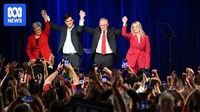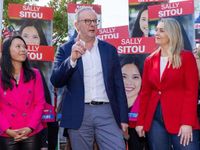In a stunning electoral outcome, the Australian Labor Party has claimed a decisive victory in the federal election held on May 3, 2025, extending Prime Minister Anthony Albanese's majority in the House of Representatives. The election results mark a significant repudiation of the Coalition, which is headed for one of its worst showings in history.
Labor's success is underscored by its ability to not only retain but also gain seats, with early counts indicating that the party has secured 86 seats compared to the Coalition's 40. The Coalition needed to pick up 19 seats to form a government but instead lost 14, leaving them in a precarious position.
Among the most notable casualties of this election was Opposition Leader Peter Dutton, who not only lost the election but also his own seat. This outcome symbolizes a broader trend of declining support for the Liberal Party across various states, including Queensland, New South Wales, Victoria, and Tasmania. In South Australia, Labor's gain of Christopher Pyne's once-safe seat has left the Liberals with just two lower house seats in the state, emphasizing the scale of the defeat.
As the election results rolled in, Albanese expressed his gratitude and determination to continue his work, stating, "We take out this task with new hope, new confidence and new determination." His emotional address to supporters reflected the significance of the moment, as he vowed to return to work the following day.
The so-called 'Teal' candidates, who gained prominence in affluent areas of Sydney and Melbourne during the last election, are poised to hold their seats, further complicating the Coalition's path to recovery. Meanwhile, the Greens are facing a tough night, with leader Adam Bandt fighting to retain his seat in Melbourne amid predictions of losing some lower house positions.
ABC chief election analyst Antony Green noted by 8:30 PM that he could not foresee a path to victory for the Coalition, forecasting likely gains for Labor. The Coalition's primary vote has slumped to record lows, while Labor's primary vote has increased nationally, reflecting a shift in voter sentiment.
This election was heavily influenced by concerns over the cost of living, with Labor's campaign emphasizing healthcare as a core issue. The party promised free GP visits and cheaper medicines, resonating with voters who have been struggling with rising costs. Albanese's campaign also benefited from the political climate surrounding former U.S. President Donald Trump's presidency, which has been seen as a liability for the Coalition.
Despite the Coalition's hopes for gains in mortgage-belt areas, Labor not only retained these seats but also made inroads in Coalition-held electorates. In Queensland, Labor scored victories in outer-suburban areas surrounding Brisbane, including Dutton's former seat of Dickson and others like Bonner, Petrie, and Forde.
In Tasmania, Labor's wins included two seats previously held by Liberals, marking a significant shift in the political landscape of the state. The Liberals are now left without any lower house MPs in Tasmania, a state that has historically been a stronghold for them.
The election results have also highlighted the resilience of independents, particularly the teal independents, who are expected to hold their seats in previously Liberal-dominated areas. The potential for new community independents to join their ranks adds another layer of complexity to the future of Australian politics.
However, the night was not without its challenges for the Greens. They lost a prominent seat to Labor, and other key figures within the party, such as Max Chandler-Mather, faced similar fates. The Greens are now anxiously awaiting the final results in three seats, with their position in the Senate remaining crucial as Labor will need their support to pass legislation.
The Coalition, facing a historic defeat, is now entering a period of introspection. Former Victorian Liberal state director Tony Barry suggested that the party could be reduced to just one seat in greater Melbourne, calling for serious "soul searching" among its ranks. Dutton himself acknowledged the need for accountability, stating, "We did not do well enough during this campaign, that much is obvious tonight, and I accept full responsibility for that."
As the counting continues in the days ahead, the political landscape of Australia is set to undergo significant changes. The election results have not only reshaped party dynamics but also highlighted the evolving priorities of the Australian electorate. With Labor's victory, the party is poised to implement its agenda, focusing on healthcare and economic stability in a time of uncertainty.
Looking forward, Albanese's government faces the challenge of fulfilling its promises while navigating a parliament that could see increased influence from independents and minor parties. The coming weeks will be critical as the final seat counts are confirmed and the implications of this election are fully realized.





